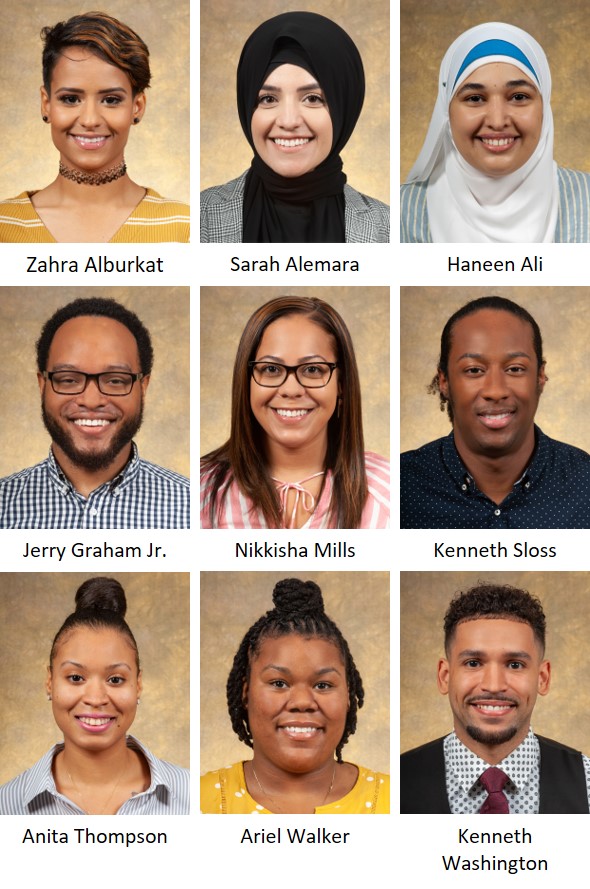Members of the 2020 cohort of the Wayne State University School of Medicine’s Pre-Medical Post Baccalaureate Program celebrated their graduation from the program with administrators during a June 4 virtual ceremony.
The event marked the 52th anniversary of the Post Baccalaureate Program.
Established in 1969 as the first program of its kind in the country, the non-degree-granting program assists qualified students in preparation for admission to medical school. The program encourages diversity in health care professions by increasing the number of physicians from educationally and economically disadvantaged backgrounds.
“You have a unique advantage,” Dean Mark Schweitzer, M.D., told the graduates. “One of my goals is to train leaders. You should be a leader of your medical group, your clinic ... . The pathway for leadership will be easier for you because of the obstacles you have overcome. You have every right to be proud. At the end of  the journey, you’re going to spend your life helping people, which is a truly righteous thing to do.”
the journey, you’re going to spend your life helping people, which is a truly righteous thing to do.”
Herbert Smitherman Jr., M.D., M.P.H, vice dean of Diversity and Community Affairs, noted that as many as 200 Michigan undergraduates apply for the program each year. A maximum of 16 students are accepted annually for the free program, which immerses students in classes that prepare them for consideration for entry into medical school. In the last 34 years, the School of Medicine has invested $36 million in the program, which has graduated more than 400 participants who have gone on to become physicians.
Dr. Smitherman noted that in his travels across the country and his interactions with hospitals and health centers, he consistently is told that physicians who graduate from WSU are “clinically ready from day one.”
“You have a more than 150-year tradition of being ready,” he told the graduates. “You’re being welcomed into that sense of excellence.
“We’re in some challenging times now,” he continued. “I am extraordinarily proud of the young people I see standing up for justice. Remember, Dr. King died in his 30s. He said that inequality and injustice in health care is the most shocking. He understood that health is a precondition for any society. No real advancement of a society or a people can occur without equitable health care. That’s where you come in. You were selected because you have everything it takes to change that arc of the curve toward justice. The gift of social change, the gift of advocacy, we see that in each of you. By investing in you, we are trusting that baton to you and trusting that you will take it forward.”
Vice Dean of Medical Education Richard Baker, M.D., told the graduates that leadership defines them, and that they must become physician leaders.
“This is what Wayne State was made for. Not just this pandemic, but the social discussion across the nation,” he said. “This will be a very special class. Being a physician is a privilege. We have to be the advocate of the patient and the community. We have to be special and rise above all of our challenges. You will be tired of being sick and tired, but you will have to pick yourself up because you will have responsibility not just for yourself but for many, many others. But you can do it. We recognize that in you.”
This year’s graduates are:
Zahra Alburkat, who received a bachelor’s degree in Nutrition and Food Science from Wayne State University. She is interested in obstetrics and gynecology, with a research interest in prenatal monitoring.
Sarah Alemara, who received a bachelor’s degree in Biological Sciences from Wayne State University. She is interested in psychiatry, internal medicine and neurology, with a research interest in cancer.
Haneen Ali, who received a bachelor’s degree with honors in Biological Sciences from Wayne State University. She is interested in family medicine, internal medicine and emergency medicine, with a research interest in food insecurities and molecular evolution.
Jerry Graham, who received a bachelor’s degree in Microbiology and Spanish from the University of Michigan. He is interested in rheumatology and head and neck oncology, with a research interest in cardiology and oncology.
Nikkisha Mills, who received a bachelor’s degree in Family Community Services from Michigan State University and a master’s degree in Interdisciplinary Health Sciences from Drexel University. She is interested in emergency medicine, obstetrics and gynecology, and surgery, with a research interest in infectious disease.
Kenneth Sloss, who received a bachelor’s degree in Biomolecular Sciences from the University of Michigan. He is interested in surgery, with a research interest in opioid use and social determinants of health.
Anita Thompson, who received a bachelor’s degree in Psychology from Michigan State University. She is interested in psychiatry and dermatology, with a research interest in bioethics and prenatal lipid levels.
Ariel Walker, who received a bachelor’s degree in Biology from Alcorn State University. She is interested in neurosurgery, with a research interest in robotics, cellular and molecular biology, and orthopedics.
Kenneth Washington, who received a bachelor’s degree in Human Biology and Neuroscience from Michigan State University. He is interested in orthopedic surgery and sports medicine.
June 5, 2020